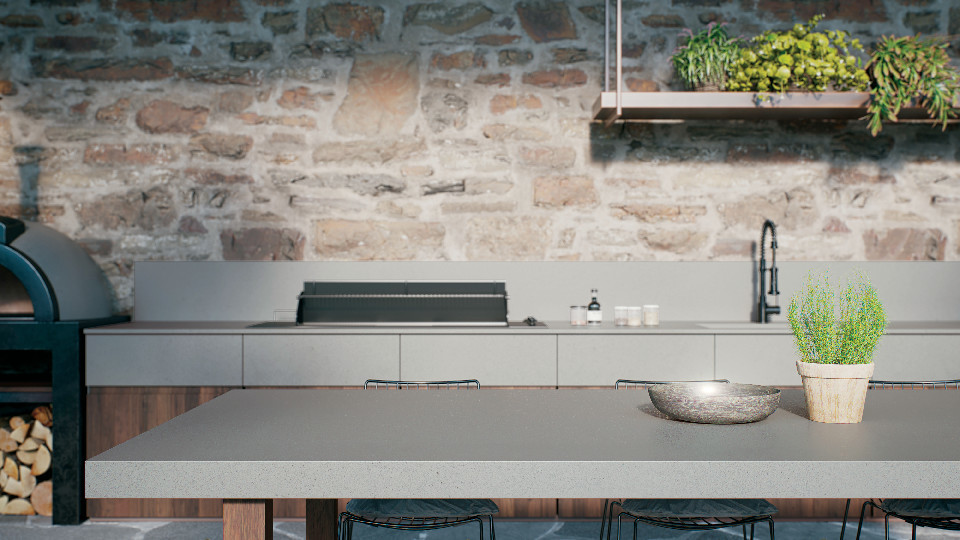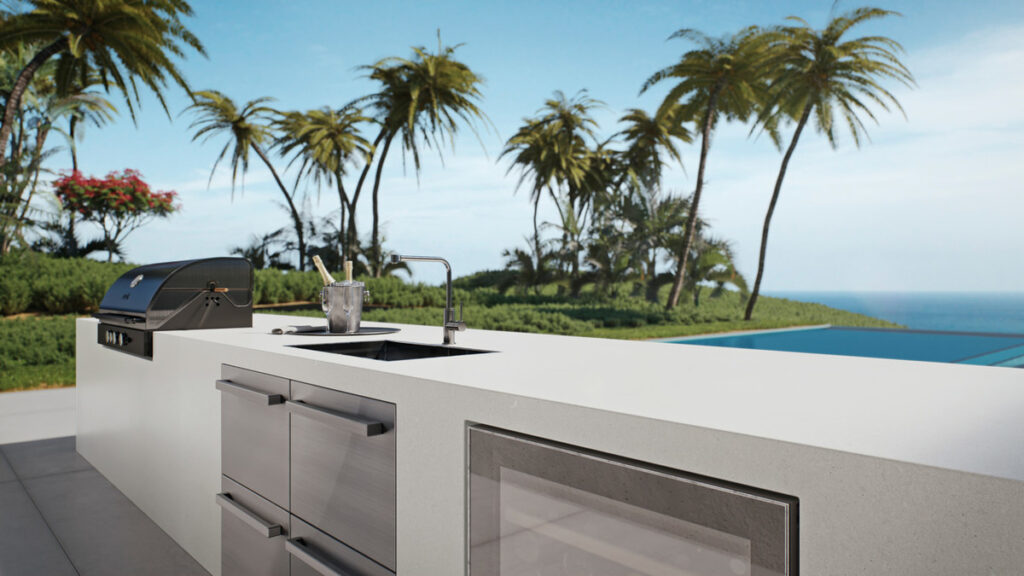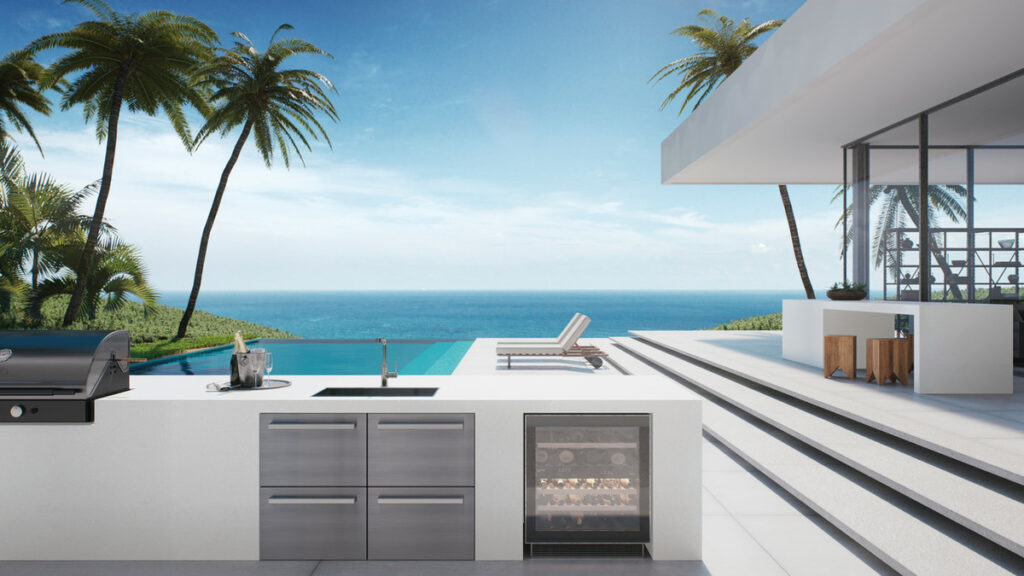Does Quartz Fade in Sunlight? How to Protect Your Countertops
6 min read
Quartz countertops are beautiful. They’re also costly, reflective of quartz’s status as a premium countertop material. Consequently, most quartz countertop owners are eager to keep their surfaces looking new for as long as possible. A common concern among new quartz countertop owners is whether the material will fade in sunlight. Read on for more.

Does quartz fade in sunlight?
Quartz countertops intended for indoor use can fade under prolonged exposure to direct sunlight but this typically only happens when such countertops are used outside. Natural light entering your home through a window is much less likely to produce this effect unless it lands directly on your countertops for extended periods.
The degree to which sunlight discolours quartz countertops will vary depending on factors such as:
Why does quartz fade in the sun? A quick science lesson
The culprit is UV rays, which bleach just about any pigmented surface. This effect isn’t limited to quartz. Any material – including granite and marble – will fade in sunlight if it hasn’t been rated specifically for UV exposure.
Here’s a quick rundown of the science behind UV rays and surface discolouration.
Ultraviolet light is a type of electromagnetic radiation. It’s an ionizing force capable of causing chemical reactions such as:
Standard windowpane glass mitigates some of these effects. This is why, for instance, transition lenses won’t activate while you’re driving. It’s also why sunlight typically won’t damage your indoor quartz countertop.

Does this mean you shouldn’t use quartz for your countertops?
Absolutely not! As we discuss on this page, quartz is the best countertop material for a variety of reasons. It offers durability, and resistance to stains, bacteria, and scratches, that other materials don’t.
You can buy quartz designed to resist fading from sunlight. Our Outdoor Collection is perfect if your sunlight-related concerns stem from plans to create a patio.
Even if you’re looking for an indoor countertop material, rest assured that quartz is more than capable of withstanding the UV exposure found in most homes. At Caesarstone, we’ve spent more than 30 years perfecting our countertops and proprietary blend of quartz and pigments. Our customers enjoy their surfaces for many, many years.
Sunlight’s ability to fade quartz countertops is often exaggerated by manufacturers specializing in other materials (namely natural stone such as granite and marble). The reality is that, as mentioned earlier, extensive exposure to UV rays will damage any surface not rated for outdoor use.
How to protect your quartz countertops from UV rays
Now that we’ve addressed concerns regarding quartz countertops and sunlight, let’s discuss how you can protect your surfaces from UV rays.
Avoid exposing your quartz countertops to direct sunlight for extended periods
If the sun shines through a small window and lands directly on your quartz countertop for a few minutes every day, it’s highly unlikely you’ll experience discolouration. Issues may arise, however, when the exposure is more extensive (i.e. you have floor-to-ceiling windows and live in a very sunny area).
In such a scenario, consider installing curtains or blinds you can pull shut during the most intense periods of sunlight exposure.

Choose the right quartz
When building an outdoor patio or kitchen, use quartz rated for that specific purpose. In addition to withstanding UV rays, such quartz will hold up against more extreme temperatures and elements than what would occur indoors.
Monitor your quartz countertops for signs of discolouration
Quartz countertops are very durable. They’re not indestructible though. As part of your maintenance routine, inspect your quartz countertops for discolouration or any other damage.
If you notice discolouration, start by ruling out other potential causes such as:
Check out this page for some tips on taking care of your quartz countertops, including which products to use for everyday cleaning and stain removal.
If you’ve ruled out these other factors and have reason to believe sunlight is the culprit, refer back to the first tip and consider installing blinds that will shield your quartz countertop during peak sunlight hours.
If you’re keen on having lots of direct natural light, consider altering your windows
If blinds would disrupt your thoughtfully crafted interior design, consider altering your windows to let in fewer harmful UV rays. This doesn’t have to be expensive. You can find clear adhesives (such as 3M™ Window Films) that go over your windows and block nearly all UV rays. You’ll still enjoy lots of natural light but your indoor surfaces will be protected.
Visit your local home hardware store to find the right fit.
Cover your countertops when not in use
If covering up your windows is not an option, consider shielding your countertop when it’s not in use. Soft, breathable fabric or a tinted sheet of glass will block harmful UV rays.
Can a quartz countertop that’s already faded from sunlight be repaired?
If UV rays have already damaged your quartz countertop, all hope isn’t lost. Contact a quartz countertop repair expert. There are techniques and strong cleaning products (including chemical dyes) that can restore your countertop’s original hue.
Keep in mind, you’ll want to address the conditions that resulted in the fading. If you used indoor quartz outdoors, it’s only a matter of time before it stains (or cracks after having been made brittle in the sun) again. If the staining occurred because of sunlight through a window, see some of the tips we provided in the previous section to correct this.
Conclusion
Does quartz fade in sunlight? Yes, it can.
However, this typically only happens if you’ve used indoor quartz outside or exposed the countertop to direct sunlight for prolonged periods every single day. Under normal conditions, discoloration from sunlight is relatively rare.
With regular care and protection from UV rays, your quartz countertops should last for many years to come. For more quartz countertop tips and inspiration, visit our blog here.
{{ subtitle }}
{{ i.desc }}
{{ subtitle }}
{{ subtitle }}